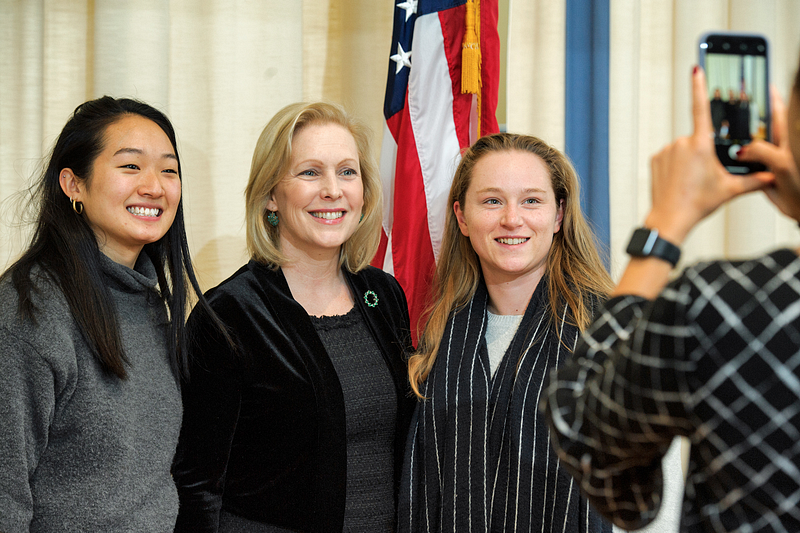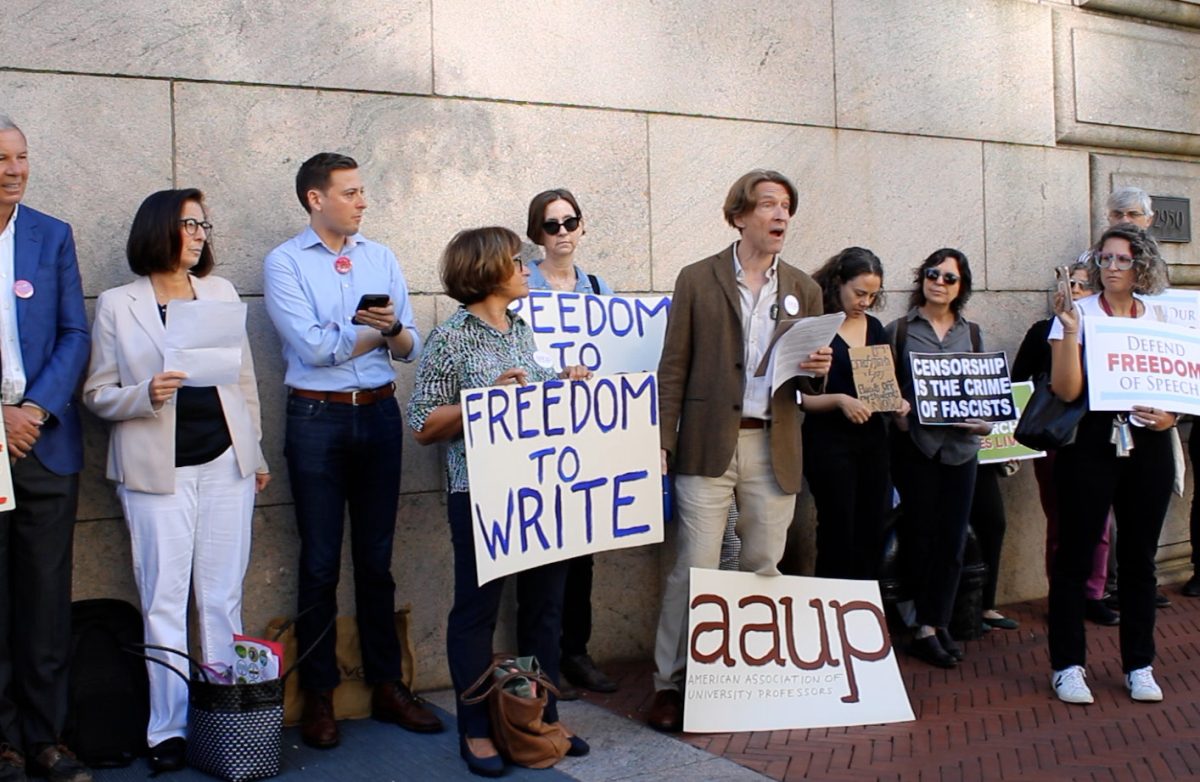
On Monday, Nov. 18, New York Senator Kirsten Gillibrand visited Hamilton’s campus to hold a town hall event in the Chapel. Senator Gillibrand answered questions from students, faculty, and community members as she emphasized the importance of student activism and civic engagement.
Originally from the Albany area, Senator Gillibrand holds an undergraduate degree from Dartmouth and a law degree from UCLA. She was previously a member of the House of Representatives from 2007–2009 representing New York’s 20th district. She was selected by Governor David Paterson to fill the open Senate seat after Hillary Clinton was appointed as Secretary of State and has served in the position since.
The Levitt Center worked with College President David Wippman’s office and Senator Gillibrand’s office to organize her visit. Marianne Janack, director of the Levitt Center, said this event fits well with the Levitt Center’s mission of public affairs.
“Helping to organize a public event for students to meet with and ask questions of a New York State Senator fit nicely with what we do regularly,” she said. “We at the Levitt Center think that helping students to understand and work within political contexts is an important aspect of what we can offer, and we’re always happy to be able to show people how smart and thoughtful Hamilton students are, too.”
President Wippman introduced the senator, who has an extensive history of involvement with upstate New York. This was not her first visit to the Hill — her brother graduated from Hamilton in 1987.
Senator Gillibrand began the town hall by describing her excitement to speak to a group of students who will contribute to and lead the debate on various issues in the future, including topics like gun control and climate change. She called for young people to demand better from their elected officials in order to end negative rhetoric, racial violence, and “shut down” hate.
Reflecting on Gillibrand’s visit, Miranda Harrigan ’22 said, “It is so wonderful to be able to have politicians come speak to us at Hamilton, especially Gillibrand since she has been here before, has a personal connection to Hamilton, and continues to come again. It was an honor to listen to her.”
Samantha Gordon ’19 agreed about the significance of Gillibrand’s visit and her interactions with students: “Gillibrand’s emphasis on engaging student voters and supporting student activism work, such as the March for our Lives and the protests at Syracuse, was very meaningful. At the same time, it is important for her and other politicians to hear what issues are important to students.”
To start the Q&A session, members of the Sunrise Movement asked Gillibrand about her position on the proposed Green New Deal legislation. Gillibrand responded that she supports the goals of the bill, referencing that her presidential platform included an aggressive climate plan that called for increasing green energy jobs, guaranteeing clean air and water, and using solar, wind, geothermal or biofuels for energy instead of fossil fuels. In addition, she said her plan made a point of denying campaign contributions from the fossil fuel industry. She added that environmental reform helps achieve intersectional change, and that expanding sustainable public housing will also provide higher access to affordable housing.
Known as an outspoken advocate of the #MeToo movement, Gillibrand reflected on the backlash and isolation she and other women have faced since speaking out about sexual assault and holding assilants accountable.
She emphasized that the risk associated with coming forward is why others should stand with those who speak out and share their truth. Gillibrand encouraged women and everyone to use their voices to stand up for what they believe in. Referencing the backlash she received from other Democrats when she called for former Senator Al Franken’s resignation in 2018, Gillibrand said that no one should put women who stand up for themselves and others at fault.
Asked about what students can do to motivate politicians to act on gun control issues, Gillbrand advised students to “keep marching” in reference to the student-run March for our Lives movement that pushed for gun reform in the aftermath of the Stoneman Douglas High School shooting in 2018. Gillibrand commended Emma Gonzalez and other student leaders from the movement for advocating for gun control. She urged students to use their votes to push elected officials to stand up to gun lobbyists like the National Rifle Association (NRA) and support common sense gun laws.
Speaking about her own involvement with the issue, Gillibrand cited her supportive efforts for a federal anti-gun trafficking law, background checks, and a ban on military-grade assult rifles. Gillibrand additionally reflected on how she realized she had to be a leader in ending gun violence after she met with families who lost their loved ones to gun violence and listened to their stories. She concluded that she had to do everything possible to make sure major shootings never happen again.
Harry Mayer ’22, who asked Senator Gillibrand a question about misinformation and misleading advertisements on Facebook and other online platforms, said, “Gillibrand was very informed on many topics, and she gave specific examples of legislation to address my question.” In response to Mayer’s question, Gillibrand’s recommendations included the creation of a cabinet position or agency focused on data management and cybersecurity to provide expertise.
Speaking on Syracuse University students’ protests in the wake of recent instances of hate speech against marginalized groups on campus, Gillibrand reaffirmed her stance that there is no place on college campuses for hate speech. She emphasized that this topic is not a freedom of speech issue and urged students to demand that college campuses be safe and require education on hate. She explained that it is important for students to understand the negative consequences that result when people do not stand up for what is right and encouraged students to push the administration to enforce repercussions against those who use hate speech.
After a member of the College Democrats spoke on the group’s efforts to increase student voting in local elections, Gillibrand emphasized the responsibility of students to defend voting rights, get out to vote, and understand that their voice matters and can change the outcome of elections, especially local elections. She also said that if elected officials will not do the people’s work, the people need to vote them out and replace them with those who are willing to drive change.
On bipartisan issues such as the Equality Act, which was passed by the United States House of Representatives on May 17, 2019 and would amend the Civil Rights Act to “prohibit discrimination on the basis of the sex, sexual orientation, gender identity, or pregnancy, childbirth, or a related medical condition of an individual, as well as because of sex-based stereotypes,” Gillibrand questioned whether other politicians are with the rest of America or if they are playing partisan politics in their opposition to the bill.
She urged the audience to fix democracy by getting money out of politics and said that she wants New York State to hold the first publicly funded election. Her re-election campaigns have been publicly funded.
Gillibrand concluded by noting that the status quo in politics fails so many groups of people, adding that robust and intersectional solutions constitute what is necessary to address issues including institutional racism, climate change, gun violence, and poverty. She predicts that people will dare to be bold and make progressive reforms in the future, led by today’s students’ demands for change.

















